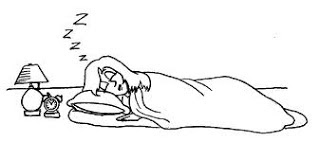Many factors affect the quality or quantity of sleep, among which are diseases, environment, fatigue, lifestyle, emotional stress, stimulants and alcohol, diet, smoking, and motivation.
1. Disease. The disease can lead to pain or physical distress that can cause sleep disorders. Individuals who are sick need more sleep than usual, in addition, sleep-wake cycles during illness may also experience interference.
2. Environment. environmental factors can help as well as hinder the process of sleep. The absence of a particular stimulus or the presence of foreign stimulus could undermine efforts to sleep. For example, the temperature is uncomfortable or poor ventilation can affect one's sleep. However, individuals can adapt over time and are no longer affected by the condition.
3. Fatigue. Tired body condition can affect a person's sleep patterns. The more tired you are, the shorter the sleep cycle "rapid eye movement" (REM) in its path. After resting normally cycle "REM" will again lengthwise.
4. Lifestyle. Individuals who frequently change working hours should regulate their activities in order to sleep at the right time.
5. Emotional stress. Anxiety and depression often disturb one's sleep. Anxiety conditions can increase the levels of blood norepinfrin simapatis nervous system through stimulation. This condition leads to reduced sleep cycle "NREM (non-rapid eye movement)" stage IV and sleep "REM" and frequent waking during sleep.
6. Stimulants and alcohol. Caffeine in some drinks can stimulate the central nervous system that can disrupt sleep patterns. While excessive alcohol consumption can disrupt the sleep cycle "REM". When the influence of alcohol has been lost, individuals often experience nightmares.
7. Diet. Weight loss was associated with decreased sleep time and seringnyaterjaga at night. In contrast, weight gain was associated with increased total sleep period and the least awake at night.
8. Smoking. Nicotine contained in cigarettes has a stimulating effect on the body. As a result, smokers often difficult to sleep and wake up at night easy.
9. Medication. Certain drugs can affect a person's quality of sleep. hypnotics can interfere with stages III and IV sleep "NREM" meta-blockers can cause insomnia and nightmares, while narcotics (eg, meperidine hydrochloride and morphine) are known to suppress sleep "REM" and cause frequent waking at night.
10. Motivation. The desire to stay awake sometimes can mask a person's feeling tired. conversely, feelings of boredom or lack of motivation to awake can often bring drowsiness.


